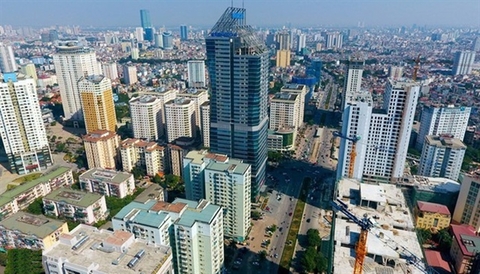according to CBRE Vietnam's quarterly report on the Hanoi market released on Tuesday at an online press conference.
 |
|
In Q2 Ha Noi's market had a total of 5,100 sold units, more than double that of the previous quarter. — Photo vneconomy.vn |
In terms of segments, 88 per cent of units launched in Q2 were in the mid-end segment while the remainder were high-end products.
Sales momentum was relatively positive in Q2 compared to the previous quarter, with more than 50 per cent of units launched during the quarter having been absorbed.
In Q2, there were a total of 5,100 sold units, more than double that of the previous quarter. The sales picked up in Q2 thanks to the social distancing order removed.
Diversification in sales channels such as online channels combined with direct marketing via sales events has boosted sales during the quarter, according to CBRE.
Especially, applications in project management and online sales have been successfully developed by many companies. Those technology platforms help to introduce projects, deal with customers and carry out online sales process.
In addition, investors and property trading floors can also receive sales data and information analysis to build suitable sales and marketing strategy, Robert Vu, CEO of batdongsan.com.vn, a popular property website in Viet Nam, said on Wednesday at a press conference releasing a report on the domestic property market in Q2.
Local buyers are the key focus of developers during the first half of the year as foreign sales have been disrupted due to the suspension of international flights.
The segment of property for foreigners buying or renting significantly slowed down due to the reduced number of foreigners travelling in Viet Nam and a significant amount of foreigners going home due to the COVID-19 pandemic, Nguyen Hoai An, director of Hanoi Branch, CBRE Vietnam told Viet Nam News.
"However, in the Ha Noi market, there were many experts of foreign companies coming back to work in Viet Nam by charter flights. Therefore, the experts must rent serviced apartments and hotels, leading to occupancy rates in many serviced apartment projects increasing from the end of the second quarter."
The hotel segment in Ha Noi was in a better situation, although it still struggles, she said.
"The prospects of this property market for foreign customers would depend on the ability to re-open international flights and borders between Viet Nam and other countries," An said.
The CBRE also reported that the Ha Noi market had about 5,600 units launched in Q2, leading to a total new launch during the first half of around 7,200 units – down 65 per cent year on year (y-o-y).
The new supply in the first six months declined significantly compared to the same period of last year due to COVID-19 disruption, said CBRE Viet Nam.
Selling prices in the primary market in Q2 averaged US$1,379 per sq.m (net of VAT), up by 3 per cent y-o-y. While mid-end products from township developments see higher selling prices due to an increasing amount of amenities, landscape and infrastructure, this segment witnessed the highest y-o-y growth of 4 per cent among segments.
The level of new supply is expected to stay at around 18,000-20,000 units in 2020, lower than 30,000 units at annual average for many years, according to the CBRE.
Nguyen Hoai An, director of Hanoi Branch, CBRE Vietnam said that: “The lower level of new supply this year allows sales to catch up quicker with the new launch which had remained at a high-level over the past five years.”
This year, total sold units might be lowered to around 15,000-17,000 units in Ha Noi due to modest sales performance in the first half of this year.
The primary pricing is forecast to remain flat in the second half of this year since new supply is heavily dominated by mid-end segment and higher competition in this segment making it harder to escalate selling prices.
According to batdongsan.com.vn, the number of searches for mini apartments (with an area of less than 45sq.m) at the end of Q2 increased by more than 200 per cent compared to February 2020.
This reflects the growing trend of more young people and families wishing to own affordable apartments. This is also a reason for investors to build studio apartments and mini apartments, according to this website. — VNS

Market stagnant, real estate firms struggle
Real estate firms have had to struggle to survive during the COVID-19 pandemic, which has caused the loss of trillions of dong and job losses to 75-80 percent of workers in the field.

Public investment to give push to Vietnam's real estate market
New policies are expected to accelerate the recovery of the real estate market and lay a firm foundation for the market’s long-term development.